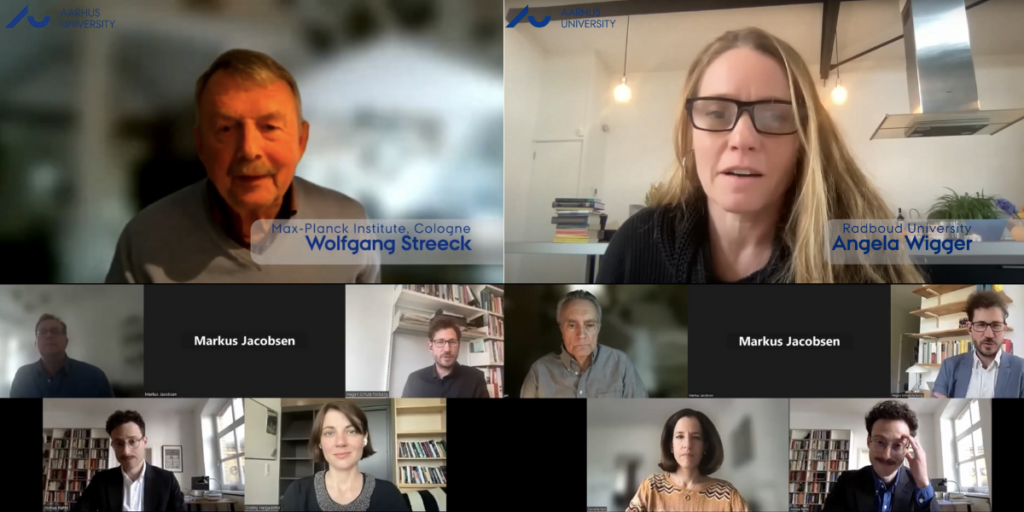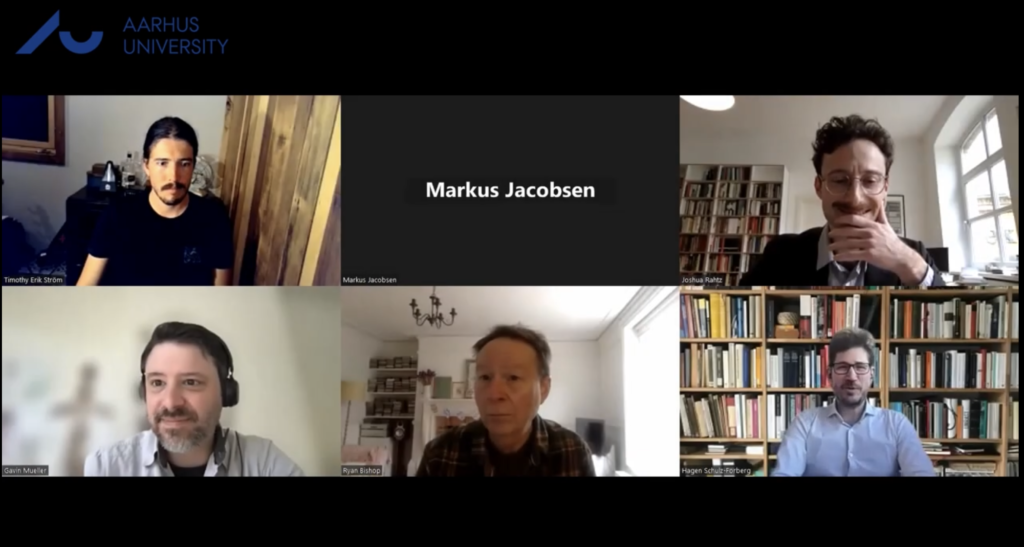Global Governance Beyond Neolberalism
The last quarter century of war and economic crisis has revealed many of the limitations of international institutions, ending the era of liberal triumphalism which succeeded the collapse of the USSR in 1991. The period since 2008, characterized by acute economic crisis, the return of apparent great power rivalries, a threat of wider war between nuclear powers, is also accompanied by the historic acceleration of inflation and low growth globally. These developments, alongside a weakening of the liberal democratic order in general, suggest that the process of globalization itself – however illusory its promises for sustained economic dynamism once were – is also now being reversed.
What are the underlying causes of the contemporary breakdown of globalization, flagging growth of the world economy, and the rise in militarism, including the militarization of much of civil society? Do such developments in turn mean that the neoliberal paradigm which informed globalization is likewise undergoing a fundamental change, or that it is itself being superseded? If the latter, by what, and driven by which political forces, deciding among which alternatives?
Project
The present era of historic transformation and crisis raises questions about how nearly all extant international and national institutions, official and civil, will respond and attempt to resolve the many contradictions now besieging them. A semester-long seminar series, one component of a project studying the world beyond neoliberalism, will be a venue for discussions among analysts of recent and contemporary history. The seminars will address a wide range of topics: from the state of international law, economic history, political theory, geopolitics and the interstate balance of power, to transformations in media and the arts.

Sessions:
1.China in the World Economy – 17. February
Exploring the political and economic implications the normalization of Chinese GDP growth have for the PRC, the Pacific region, and the world economy, which has come to rely on China as the workshop of the world.
2.Strategies of US Foreign Policy – 24. February
Discussing US security and commercial imperatives, a long-term strategy informing US foreign policy and potential future implications.
3.New Media, Big Data, Civil Society – 15. March
Examining some of the recent political-economic debates on so-called technological feudalism, as well as qualitative changes in the lifeworld now taking place.
4.Global Economies, Regional Realities – 28. March
Globally oriented educated populations and the professional politicians representing them face the pauperized working class of the hinterlands across Europe, the US, Latin America and Asia. What is the economic basis of this division, how does it interact with the recent diplomatic and military developments…?
5.New Claims on Global Order – 13. April
What could a neaoliberalist international political economy look like, and what role will international law play in it? Will the US revert to a strategy based on more direct forms of coercion and domination, or will it cede limited ground to the rising powers it has designated as strategic rivals, to make way for a more or less peaceful transition to an epoch of true multipolarity, mediated by law?

6.International Law? – 20. April
What is the current state of international law? How international is it, and does it command the status of law, even partially, with a sovereign power capable of adjudication and enforcement? The panalists present their views on the conceptualization of international law and outline prospects for the legal institutions which aim to operate internationally.
7.Technocracy or Economic Democracy? – 5. May
Our panelists consider possible alternatives now taking shape: a globalized form of economic administration, incorporating a generally depoliticized population reduced to spectatorship, or a revival of popular democratic participation in economic affairs.
8.An Economic-Ecological Regime? – 11. May
Discussing the question of democratic self-determination which accompanies possible technocratic fixes for environmental crises, and the implicit politics of any program which relies mainly on the judgment of experts and scientists.
9.European Neoliberalism – 24. May
The panelists examine the historical development of this influential school of economics, its political meaning, and evaluate its persistent effects on European Union institutions and policies.
Watch all recorded sessions here.

Summary – what have we learned?
With nine seminars addressing different aspects of global governance, the project gave insightful answers and posed interesting new questions to a broad variety of themes. While it is hard to do the entire series justice in one big swoop, here are some key topics, questions, and challenges that ran throughout the seminars.
Starting with first a seminar on China and then on the United States (US), set the stage for the centrality of the relationship between these two great powers. The increasing rivalry that characterizes this relationship has impact beyond just the field of US-China relations. It brings tension and upheaval to global security and political-economy. As the seminar on an ecological economic regime showed, it already has had big impacts on the global green transition. Still, the rivalry may also develop into a rivalry in terms of funding global public goods, which could lead to positive developments and could open possibilities, especially in the Global South.
Another theme running through many seminars is that of the role of knowledge and expertise in global politics. While technocratic tendencies may already be part of global governance, questions remain as to how this plays out in a changing world. As the seminar on New Media, Big Data, Civil Society showed, abstract knowledge and the ability to slice up phenomena into smaller, storable pieces – be they numbers, code, or other forms of data – is a great source of power and domination, a source that has historically been located in the Global North. Whether this continues to be the case remains to be seen, as does whether the dominance of neoliberal market-based quantifications endures. Regarding the latter, both Angela Wigger and Wolfgang Streeck argued that we ought to have a critique of the sovereignty of prices, echoing John Maynard Keynes’ point that capitalism devalues life because of price mechanisms.
Expertise also has implications in the important field of international law. As Martti Koskenniemi argued, the fields of international law and politics cannot be separated but are rather two alternative descriptions of a world that remains one. One key political challenge in international law is what Koskenniemi calls the politics of definition. One of the most central recent developments in international law has been the intensification in the role of experts. As international law has become more stratified, increasingly, environmental lawyers work on environmental law, trade lawyers work on trade law etc. This can cause two main problems. Firstly, richer countries are more likely to be able to afford experts, whereas poorer countries will rely on generalists. Secondly, it increases the dominance of people educated in northern institutions being relied upon by the south. The turn to expertise then brings with it the threat of strengthening northern hegemony in international law.
These questions are part of a general focus on the relationship between continuations and breaks. As many seminars have hinted at, the current moment of crisis and change inevitably asks the question not only of where we are and where we are going but also, what was? While big shifts in economic and financial policies have occurred, broadening our understanding of what neoliberalism was/is, opens possibilities for better analyzing potential continuities in these shifts. Furthermore, as the seminar on New Claims on Global Order showed, there might even be room for a liberal rejection of neoliberalism. On the other hand, as our panelists in the final seminar on European neoliberalism explained, the flexibility of neoliberalism as an ideology, as well as the economics profession it has so often been associated with, is an important factor to keep in mind.
What actors, institutions, and states are then central in these changes? Where is the agency? While looking beyond the nation state is important and the relevance of non-state actors has come up time and time again, the idea that globalization would reduce states’ influence on global politics, economics, and governance has not been born out. States, especially great powers, remain important. As John Mearsheimer argued in the panel on US foreign policy, trans- and international cooperation, especially through economic trade, may be fine for a while, but when push comes to shove, power politics and the state suddenly matters a great deal. Yet, there are also important insights found when opening the realist black box of the state. As many panelists have shown, internal power struggles, especially within powerful states, often have global consequences. For example, the influence of more localized forms of capital in the Trump administration as well as the Obama presidency’s success in turning the US from a net energy importer to exporter, have had a serious impact on global trade and security, far beyond US borders and relations.
Finally, what might be new ways of understanding global governance? What could emerge as an alternative to neoliberal ideas and concepts for guiding this understanding? Several ideologies, principles, and analytical theories have been brought up. The specter of a cold war 2.0 looms large and with that increased securitizations and power politics. So too does technocracy, though potentially in a more regionalized, non-internationalist form than previous iterations. On a more positive note, hopes of a liberal rejection of neoliberalism, prioritizing liberal-democratic values above economic competition lives on. So does greener visions of the future. The idea of “the Planetary” as both James Quillligan and Dominic Sachsenmeier presented in their interviews, has spread in both academic and public discourse especially through the idea of planetary limits to growth. The dream of a more planetarily aligned form of economics already brings new ideas of quantification, expertise, political goals, historical awareness etc., all ideas that could challenge neoliberal dogma. Still, with massive amounts of economic, political, and social capital having been invested in both fossil-driven and neoliberal economies, the big question remains, from where and by whom could such challenges gain proper momentum?

Project Participants


Panelists
Helmut Anheier
Hertie School
Bastiaan van Apeldoorn
Vrije University, Amsterdam
Alyssa Battistoni
Barnard College
Ryan Bishop
University of Southhampton
Vladimir Pacheco Cueva
Aarhus University
Philip Cunliffe
University College London
Naná de Graaff
Vrije University, Amsterdam
David Singh Grewal
University of California, Berkeley
Oddný Helgadóttir
Copenhagen Business School
Ho-fung Hung
Johns Hopkins University
Christian Joerges
Hertie School
Martti Koskenniemi
University of Helsinki
John J. Mearsheimer
University of Chicago
Gavin Mueller
University of Amsterdam
Dieter Plehwe
WZB Social Science Center Berlin
James Quilligan
Economic Democracy Advocates
Dominic Sachsenmaier
University of Göttingen
Victor Shih
University of California, San Diego
J.P. Singh
George Mason University
Douglas Spencer
Iowa State University
Wolfgang Streeck
Max Planck Institute, Cologne
Timothy Erik Ström
Arena Online
Claire Tixeire
European Center for Constitutional and Human Rights
Simone Turchetti
University of Manchester
Paweł Wargan
Progressive International
Angela Wigger
Radboud University
Cornelia Woll
Hertie School
Zhu Yi
Heidelberg University